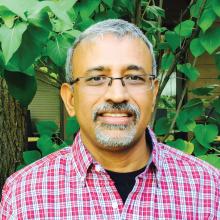Balaji Rajagopalan, PhD
Professor of Civil, Environmental & Architectural Engineering, University of Colorado – Boulder
Consortium- Executive Board
Balaji Rajagopalan received his B.Tech. degree in Civil Engineering from the National Institute of Technology, Kurukshetra, India in 1989, an M.Tech. degree in Optimization and Reliability engineering from Indian Statistical Institute, Calcutta, India, in 1991 and, a Ph.D. from Utah State University, Logan, UT, in 1995, with a specialization in stochastic hydrology and hydroclimatology. Following this he worked as a Research Scientist at Lamont-Doherty Earth Observatory of Columbia University, NY, before joining the faculty of Department of Civil, Environmental and Architectural Engineering (CEAE) at University of Colorado, Boulder, CO, as Assistant Professor in fall 2011. He was promoted to Associate Professor in 2007 and to full Professor In 2010. He is the Chair of CEAE since Fall 2014. Competition for freshwater resources is intense as global populations increase. Given the spatial and temporal variability of the resource, constrained water quantity and quality have emerged as dominant global risk management and sustenance concerns for the 21st century. His research program is an interdisciplinary effort to address these problems. This entails three interconnected themes: (i) Understanding the large-scale climate drivers of year-to-year and multidecadal variability of regional hydrology (i.e., precipitation, streamflow etc.) (ii) Developing ensemble hydrologic forecast and simulation tools that incorporate the large-scale climate information and, (iii) Coupling the forecasts with water resources decision support system. His research has proven to be of immense value in the operations, management and planning of water resources in the semi-arid river basins of Western USA, especially the Colorado River System. For this he was a co-recipient of the Partners In Conservation Award from the Department of Interior in 2009. In addition, he has made significant contributions to understanding the Indian summer monsoonal climate variability and predictability. For his joint work on unraveling the mystery of Indian summer monsoon droughts that appeared in Science in 2006 he was a co-recipient of the prestigious Norber Gerbier Mumm Award from the World Meteorological Organization in 2009. He has also developed statistical tools with collaborators to model and quantify uncertainty in a variety of areas such as, drinking water quality, waste water treatment resiliency, building systems energy, construction delay management due to weather and climate and agriculture management. His diverse educational background (engineering, optimization, stochastic Methods, hydroclimate) and research experience has facilitated the development of a robust interdisciplinary research program. Which is reflected in his publication record of over 130 articles in leading diverse journals like Science, Nature Geoscience, Water Resources Research, Journal of Climate, Geophysical Research Letters and, Environmental Science and Technology, ASCE Construction Engineering and Management, Building Performance and Simulation. He has taught courses in Hydraulics, Hydrology, Civil Engineering Design, Hydroclimatology and Statistical methods. He has advised and co-advised 15 Ph.D. dissertations and 16 M.S. theses. He has served on the US CLIVAR panel on Prediction, Predictability and Applications, one of the main bodies that help set the US climate research agenda. He served as associated editor of ASCE Journal of Hydrologic Engineering, Journal of Water Resources Planning and Management and Geophysical Research Letters and currently serves as an associate editor of Water Resources Research and Climate Research.


